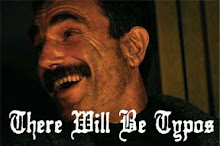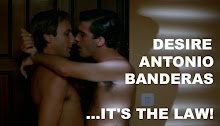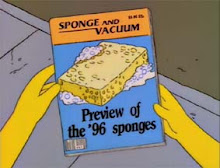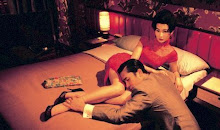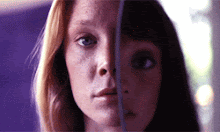Showing posts with label George Romero. Show all posts
Showing posts with label George Romero. Show all posts
Wednesday, January 28, 2015
Friday, November 1, 2013
Wednesday, December 17, 2008
Cult Oddities: Season of the Witch (1972)
...or "Desperate Pagan Housewives"

Season of the Witch (aka Hungry Wives) is like George A. Romero's cinematic stepdaughter. She's not the prettiest in the bunch, she's gone largely ignored, and her father has barely a kind word to say about her. Certainly her zombie brothers have stolen the thunder in Romero's long genre career, but that's not entirely surprising after watching this hard-to-find early effort. It's stilted, stylistically awkward, and oftentimes distancing. That said, some of this seems very much intentional, and it does remind us of what was so brilliant about seventies horror. Even when they were at a questionable level of quality or content, there was always something substantial brewing beneath the surface.

The plot here concerns a housewife, Joan Mitchell, who tires of mundane social connections, her wayward daughter and dismissive husband. What does she have to turn to other than alcoholism or the dark arts? Her suburban malaise morphs into magic and murder, but then Joan's never been very good at baking or the PTA.

Romero's films are always tinged with social commentary, and in keeping, Season of the Witch marks his first foray into post-feminism mixed with his usual stabs at middle-America. Many of these digs come about in the disorienting dreams of Joan -- the film's best cinematic highlight. Joan's fantasies begin to meld with disturbing reoccurring nightmares of a home invasion, in which a masked man traps Joan inside and violates her. Joan seems pathetically lustful for sexual encounters, even working herself into a frenzy during her daughter's forays in the next bedroom. But these particular dreams seem at odds with that -- she genuinely fears them. It's no coincidence then that soon the terrifying invader crosses with the reality of Joan's husband returning home. Joan's nightmare IS her reality.

The way that witchcraft involves itself is what makes the film unique, and also what makes it a bit of a mess. It's exactly that supernatural angle with which the film struggles. Not the least of which is a humorous montage set to Donovan's title-track "Season of the Witch," which seems to be invoking Joan's escape from suburban hell via an urban occult shopping spree. Her dabbling in the craft becomes almost a secondhand joke, but perhaps even that's intentional. She takes it up like someone would take up knitting. Joan doesn't know what she's doing but becomes completely invested in it -- too much so. It ultimately just magnifies her desperation. Clearly the woman's in need of something when THIS guy causes her radical sexual awakening...

Romero's said before that Season of the Witch is the one film of his he would consider remaking, and given the flat performances and sometimes dodgy direction, it wouldn't be the worst idea. It's time to reunite with your stepdaughter, George. The devil knows there's a wealth of wit hidden under that patchouli haze.

Thursday, August 7, 2008
The Horror... The Horror...
Horror is often viewed as a lesser genre by the film community, but the truth is that horror has always been capable of tackling issues in ways that other genres simply can't or wouldn't dare. Horror films needn't appeal to taste, nor stop short of digging the knife in where it really hurts. That's why this year's crop of horror releases seem just as topical as any one of the many dramas or documentaries on wartime and environmental distress. These films turn the current social terrors into celluloid trauma, and if they're any indication, we're in some very big trouble...

Guess Who's Coming to Dinner
A fear of unwanted guests, or company that overstays their welcome?
Bryan Bertino's The Strangers and Michael Haneke's retelling of Funny Games are brutal, bleak, and about as subtle as a hydrogen bomb. The terrifying reality of a home invasion is at the forefront of both films as cute couples venture to their secluded summer homes in search of some serenity...

The Strangers ties itself to the 70's era in tone and subject as Manson Family-like trio invade and slaughter a young couple without cause or purpose. The grim "story" takes a knowing throwback to the late Vietnam-era and parallels that with a more modern paranoia. "The Strangers" remove their masks before committing their heinous acts, and yet they remain faceless to the audience. They're clearly human and yet their only rationale for hacking up this specific couple is their chilling and vague pronouncement that it's "because you were home." There is no logic in the horror and no catharsis in defeat. This violence is permanent, ugly, and it shows no signs of stopping.

Funny Games takes this on as a direct thesis. Why are we even watching this sick film? Haneke too denies the audience any heroics or joyfully devious villains. His bad guys aren't your standard madman slashers hidden behind a spooky mask. Here they're just genteel golfers who want to borrow some eggs... with a side of social commentary mind you. This time the husband won't be saving the day, the kids aren't safe, and we can't just marvel at the showstopping scenes of gore. The upper class couple that finds themselves victim love listening to opera, they like to sail... This is their perfect pleasurable escape. They're even sheltered by their gated community and yet violence still finds a way in. Just like Haneke asks of the audience, it's time that this all American family face up to the grisly reality. In the real world, you can't just press rewind.
The Real World: Hell
This is the true story of seven strangers picked to live in a house, work together, and have their lives taped; to find out what happens when people stop being polite and start getting eaten.
George A. Romero's Diary of the Dead and Jaume Balaguero's [Rec] aren't exactly breaking new ground by using zombies to reflect the the horrors of humanity, especially since Romero invented the tactic back in the sixties. What they do offer are very up-to-the-minute reflections and quite literal dissections.

Romero's Diary of the Dead takes the undead into the internet era, where real world chaos can be uploaded and downloaded in mere seconds. He ponders explicitly how an epidemic such as a zombie outbreak would manifest itself in an age that's so technologically connected and yet so socially disconnected. Like Land of the Dead before it, Romero's attacking our culture with direct jabs at the Bush administration and a palpable sense of declining humanity. Where do we cross a line when it comes to the media onslaught, and what's really behind all this worldwide bloodshed?

[Rec] plays on themes of paranoia and the threat of biological warfare, when a television news crew is quarantined with the undead. While it doesn't offer the kind of direct commentary Romero's films do, [Rec] and perhaps even Cloverfield manage to address the influence of the media in the face of worldwide tragedy. Every horrific moment can be documented, and for the characters within, the act of documenting becomes their purpose for survival: they want to spread the message and the "truth" of the events to the public. The irony is, with so many different angles and so many different takes, where does the truth actually lie?
She's One Bad Mother
Nature's dealing some bad weed...
The ever emerging visibility of Earth's decay has become the center for several tales of terror, such as Carter Smith's The Ruins and M. Night Shyamalan's The Happening. We've done just about enough to destroy nature and now it's taking its turn... on us!

The Ruins tackles a pervasive sense of social paranoia and also an an age-old theme about the dangers of tampering with nature itself. The plants inside the ancient ruins have been forced to adapt. They feed off humans as much as the land; they mimic human voices and cell phone rings just to lure them in. This could all be cause of some ancient curse, but even that's adapting to the modern age. The Ruins places the environment at odds with its characters - they're fully under its control. Nature literally consumes them. After all, we all end up as fertilizer eventually.

The Happening is even more literal in how it places the environment at odds with the human race. Because of human interference, nature has no choice but to fight back. So killer shrubs might not seem so terrifying on film, but such an unexplainable shift in atmosphere might do the trick in our reality. Shyamalan all but says "Go Green!" Alas, driving a Prius ain't gonna cut it... We're at odds with our landscape and the very air we breathe.
So what's the next social subject ripe for terror, and what will the horror genre look like in 2009? When the new Jason Voorhees inevitably gets killed, will he be made of 100% recyclable material?

Guess Who's Coming to Dinner
A fear of unwanted guests, or company that overstays their welcome?
Bryan Bertino's The Strangers and Michael Haneke's retelling of Funny Games are brutal, bleak, and about as subtle as a hydrogen bomb. The terrifying reality of a home invasion is at the forefront of both films as cute couples venture to their secluded summer homes in search of some serenity...

The Strangers ties itself to the 70's era in tone and subject as Manson Family-like trio invade and slaughter a young couple without cause or purpose. The grim "story" takes a knowing throwback to the late Vietnam-era and parallels that with a more modern paranoia. "The Strangers" remove their masks before committing their heinous acts, and yet they remain faceless to the audience. They're clearly human and yet their only rationale for hacking up this specific couple is their chilling and vague pronouncement that it's "because you were home." There is no logic in the horror and no catharsis in defeat. This violence is permanent, ugly, and it shows no signs of stopping.

Funny Games takes this on as a direct thesis. Why are we even watching this sick film? Haneke too denies the audience any heroics or joyfully devious villains. His bad guys aren't your standard madman slashers hidden behind a spooky mask. Here they're just genteel golfers who want to borrow some eggs... with a side of social commentary mind you. This time the husband won't be saving the day, the kids aren't safe, and we can't just marvel at the showstopping scenes of gore. The upper class couple that finds themselves victim love listening to opera, they like to sail... This is their perfect pleasurable escape. They're even sheltered by their gated community and yet violence still finds a way in. Just like Haneke asks of the audience, it's time that this all American family face up to the grisly reality. In the real world, you can't just press rewind.
The Real World: Hell
This is the true story of seven strangers picked to live in a house, work together, and have their lives taped; to find out what happens when people stop being polite and start getting eaten.
George A. Romero's Diary of the Dead and Jaume Balaguero's [Rec] aren't exactly breaking new ground by using zombies to reflect the the horrors of humanity, especially since Romero invented the tactic back in the sixties. What they do offer are very up-to-the-minute reflections and quite literal dissections.

Romero's Diary of the Dead takes the undead into the internet era, where real world chaos can be uploaded and downloaded in mere seconds. He ponders explicitly how an epidemic such as a zombie outbreak would manifest itself in an age that's so technologically connected and yet so socially disconnected. Like Land of the Dead before it, Romero's attacking our culture with direct jabs at the Bush administration and a palpable sense of declining humanity. Where do we cross a line when it comes to the media onslaught, and what's really behind all this worldwide bloodshed?

[Rec] plays on themes of paranoia and the threat of biological warfare, when a television news crew is quarantined with the undead. While it doesn't offer the kind of direct commentary Romero's films do, [Rec] and perhaps even Cloverfield manage to address the influence of the media in the face of worldwide tragedy. Every horrific moment can be documented, and for the characters within, the act of documenting becomes their purpose for survival: they want to spread the message and the "truth" of the events to the public. The irony is, with so many different angles and so many different takes, where does the truth actually lie?
She's One Bad Mother
Nature's dealing some bad weed...
The ever emerging visibility of Earth's decay has become the center for several tales of terror, such as Carter Smith's The Ruins and M. Night Shyamalan's The Happening. We've done just about enough to destroy nature and now it's taking its turn... on us!

The Ruins tackles a pervasive sense of social paranoia and also an an age-old theme about the dangers of tampering with nature itself. The plants inside the ancient ruins have been forced to adapt. They feed off humans as much as the land; they mimic human voices and cell phone rings just to lure them in. This could all be cause of some ancient curse, but even that's adapting to the modern age. The Ruins places the environment at odds with its characters - they're fully under its control. Nature literally consumes them. After all, we all end up as fertilizer eventually.

The Happening is even more literal in how it places the environment at odds with the human race. Because of human interference, nature has no choice but to fight back. So killer shrubs might not seem so terrifying on film, but such an unexplainable shift in atmosphere might do the trick in our reality. Shyamalan all but says "Go Green!" Alas, driving a Prius ain't gonna cut it... We're at odds with our landscape and the very air we breathe.
So what's the next social subject ripe for terror, and what will the horror genre look like in 2009? When the new Jason Voorhees inevitably gets killed, will he be made of 100% recyclable material?
Friday, May 2, 2008
When there's no more room in hell, the dead will blog...
When I finally sat down to watch George A. Romero's recent zombie opus, Diary of the Dead, I had the momentary sensation I'd turned on an episode of quarterlife instead. Only this week's episode seemed suspiciously less dour.

Yes, the man who all but gave birth to the undead (creepy image, right?) has now brought his creations into the modern age. Once they've evolved to using weaponry, can myspace be far behind? These are the very current and legitimate questions Romero tends to comment on with his commentative social commentary. That's a lot of commenting you might say, but you obviously haven't been hanging around film students on an RV, videotaping the world's collapse by the walking dead, now have you?
Night of the Living Dead, Dawn of the Dead, Day of the Dead... all startlingly intelligent, gruesome films that serve as great reflections of their times, while still remaining relevant today. These film students speak overt politics about the war on terror, about skewed media perceptions, and the desire to have a voice of truth in the present flood of voices. That's all well and good, can't we all relate... But imagine what it would have been like if our favorite foursome had gone into Monroeville Mall back in 1978 and said, "the dead are gathering here as a representation of our absurd consumer culture. Why it's almost like we're not that different from the dead ourselves... I guess we should head home then?"
Romero's commentary has never been on the subtle side and it was always shaded between action sequences, tension and comedy, enough to make the package almost remarkably thoughtful and entertaining. Diary attempts this, but every action must be labeled. Blunt head trauma becomes blunt head trauma. The varying viewpoints and verbose characters don't make one think about truth or the current social climate, because one needn't think when there's a literate professor, a world-weary narrator, and five people shouting off camera.

How's the gore? Well it's decent, explicit, and works on the admirable low budget, but it's not the gut-munching slaughterhouse one might expect of a film meant to reflect the savage modern times. It's all a bit lifeless, ironically, and this is a movie with a pool of zombies! It's just not right. Romero's a gifted man, but he's already given so much to the undead community, can't he dabble elsewhere?
(Anyone else want to see this movie narrated by Daniel Stern, ala. The Wonder Years?)

Yes, the man who all but gave birth to the undead (creepy image, right?) has now brought his creations into the modern age. Once they've evolved to using weaponry, can myspace be far behind? These are the very current and legitimate questions Romero tends to comment on with his commentative social commentary. That's a lot of commenting you might say, but you obviously haven't been hanging around film students on an RV, videotaping the world's collapse by the walking dead, now have you?
Night of the Living Dead, Dawn of the Dead, Day of the Dead... all startlingly intelligent, gruesome films that serve as great reflections of their times, while still remaining relevant today. These film students speak overt politics about the war on terror, about skewed media perceptions, and the desire to have a voice of truth in the present flood of voices. That's all well and good, can't we all relate... But imagine what it would have been like if our favorite foursome had gone into Monroeville Mall back in 1978 and said, "the dead are gathering here as a representation of our absurd consumer culture. Why it's almost like we're not that different from the dead ourselves... I guess we should head home then?"
Romero's commentary has never been on the subtle side and it was always shaded between action sequences, tension and comedy, enough to make the package almost remarkably thoughtful and entertaining. Diary attempts this, but every action must be labeled. Blunt head trauma becomes blunt head trauma. The varying viewpoints and verbose characters don't make one think about truth or the current social climate, because one needn't think when there's a literate professor, a world-weary narrator, and five people shouting off camera.

How's the gore? Well it's decent, explicit, and works on the admirable low budget, but it's not the gut-munching slaughterhouse one might expect of a film meant to reflect the savage modern times. It's all a bit lifeless, ironically, and this is a movie with a pool of zombies! It's just not right. Romero's a gifted man, but he's already given so much to the undead community, can't he dabble elsewhere?
(Anyone else want to see this movie narrated by Daniel Stern, ala. The Wonder Years?)
Subscribe to:
Posts (Atom)




















